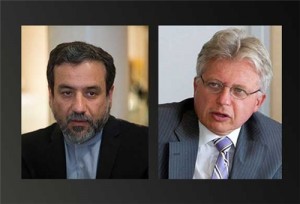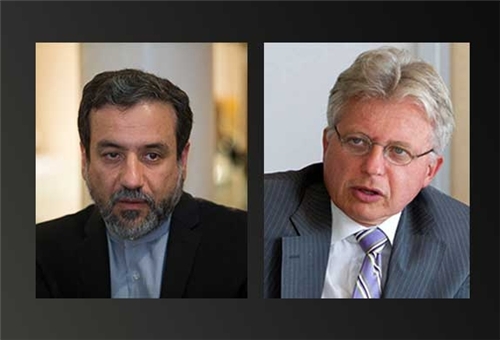 TEHRAN (FNA)- Iranian and German officials held a meeting on the sidelines of the multilateral talks between Iran and the six world powers in Geneva.
TEHRAN (FNA)- Iranian and German officials held a meeting on the sidelines of the multilateral talks between Iran and the six world powers in Geneva.Iranian Deputy Foreign Minister for Legal and International Affairs Abbas Araqchi discussed issues of mutual interest with Hans Dieter Lucas, the German Envoy to the G 5+1 (the US, Russia, France, Britain and China plus Germany) talks with Iran, on Wednesday.
Araqchi had already met twice with Russian Deputy Foreign Minister Sergei Ryabkov, US Assistant Secretary of State Wendy Sherman and French Envoy to the talks Jaquea Audibert.
The talks in Geneva marked the first time Iran and the world powers had met since President Hassan Rohani's election.
Questions remained Wednesday over the proposal presented by Iran's foreign minister the day before. At this stage, it appears as though the Iranian proposal includes the willingness to limit uranium enrichment, but also a demand that the world powers recognize Iran's right to enrich uranium on its soil.
Iran discussed limiting uranium enrichment with the world powers and reportedly expressed willingness to discuss signing the "additional protocol" - snap inspections of its nuclear facilities.
"None of these issues exist in the first step, but they are part of our last step," Araqchi said.
The Iranian deputy foreign minister and his advisers met earlier Wednesday with the negotiating teams of the European Union, the United States, Russia, China, Germany, Britain, and France. A second meeting between the Iranian delegation and the representatives of the six world powers took place on Wednesday afternoon.
On Wednesday morning, several reports surfaced regarding the three-staged Iranian proposal to the world powers, due to be enacted within 6-12 months. AP reported that the Iranians are proposing to limit uranium enrichment as well as the number of centrifuges doing the enrichment. The Russian news agency RIA Novosti reported that Iran is prepared to suspend uranium enrichment at 20%, but demands the removal of international sanctions in return.
Iran and the six world powers agreed in their third session of talks on Wednesday afternoon to hold a follow-up round of nuclear negotiations on November 7 and 8.
Some other reports spoke of the acceptance of the Additional Protocol to the nuclear Non-Proliferation Treaty (NPT) by Iran, which includes snap inspections of Iran's nuclear facilities. Endorsement of the Additional Protocol needs the approval by not just the Iranian government, but the parliament.
And in response, senior Iranian parliamentary officials underlined that accepting the Additional Protocol should take place after the world powers recognize all the nuclear rights of the Iranian nation.
�Accepting the Additional Protocol depends on the recognition of all the nuclear rights of the Iranian nation, including (uranium) enrichment" by the world powers, the Presiding Board member of the parliament�s National Security and Foreign Policy Commission, Mohammad Hassan Asafari, told FNA on Wednesday.
He reiterated that Iran has transparent criteria in its talks with the western powers which include protection of the inalienable right of the Iranian nation to use the nuclear energy and uranium enrichment.
�Acceptance of the Additional Protocol needs the parliament�s approval and if the talks take place within this framework and the Iranian nation�s rights are respected, this can be studied,� Asafari said.
Also, another ranking member of the Iranian legislator, Hassan Kamran, said the legislature is going to study the Additional Protocol to the NPT on Sunday, reiterating that any acceptance of the protocol needs the parliament�s approval.
�This issue (Additional Protocol) needs the parliament�s approval and we will discuss it in the Sunday session of the National Security and Foreign Policy Commission,� member of the parliament�s National Security and Foreign Policy Commission Hassan Kamran said Wednesday.
�All the people who represent Iran in the negotiations should consider the country�s national interests,� he added.
Yesterday, Asafari announced that the parliament�s National Security and Foreign Policy Commission would review the outcome of the talks between Iran and the six world powers in its upcoming session on Sunday.
�In this session the subjects and topics discussed in the negotiations will go under precise study,� Asafari told FNA, and added, �Supervision over the performance of the country�s diplomatic apparatus is a duty of the parliament and its National Security and Foreign Policy Commission."
The additional protocol was created following the discovery of clandestine nuclear weapons programs in Iraq and North Korea during the 1990s. Countries conclude specific additional protocols to supplement their IAEA safeguards arrangement.
For the Additional Protocol to be enforced in any country, it needs the approval of both the government and the parliament of that country.
In addition to those which have basically rejected endorsement of the NPT, most signatories to the NPT have also defied accepting the agreement. Accepting the protocol is a voluntary, and not compulsory, decision.
By Fars News Agency
The Iran Project is not responsible for the content of quoted articles.











